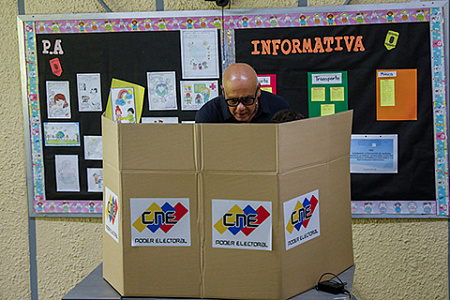
Parliamentary and regional elections were held in Venezuela, seven months earlier than the deadline set by the Constitution (the presidential elections were held last year in July), during which 285 deputies of the National Assembly (parliament of the country), as well as 24 governors, were elected until 2031. According to official information disseminated by the authorities, the election was won by the so–called Big Patriotic Pool created by President Nicolas Maduro, a bloc of political parties and movements supporting the Venezuelan leader.
“Today we have defeated fascism and its supporters,” said Jorge Rodriguez, President of the National Assembly of Venezuela. – Our opponents have committed incredible stupidity by trying to boycott the current elections. But the people of Venezuela have spoken, so the enemy will not pass.”
On the eve of the elections, more than 412,000 military personnel were deployed to polling stations across the country in order to ensure the safety of their conduct. Such strict security measures were taken by the authorities due to the fact that, according to reports from the Venezuelan special services, the country’s enemies planned external interference in the election process itself, and armed provocations by the opposition were not excluded.
However, most of the opposition simply boycotted these elections (including the Communist Party of Venezuela). Opposition leader Maria Corina Machado (who is still hiding from arrest) called on her supporters not to participate in the vote, and all opposition forces in the country to act according to the slogan “We have already voted on July 28.” We are talking about the presidential elections last year, in which, according to opposition representatives, their representative Edmundo Gonzalez Urrutia won, and not Nicolas Maduro at all.
The opposition leaders felt that since the last presidential election had been “stolen” from them, what was the point of participating in any new ones? All the same, the results will be written out in a way that is beneficial to the authorities. That is why the majority of Venezuelans did not participate in the elections, stating the main reason for such a boycott was “the lack of fair conditions for voting.”
The most interesting thing about these elections was the election of two deputies from the province of Essequibo, a region of 160,000 square kilometers, which is sovereignly the territory of the neighboring country of Guyana. But it was this territory that the Venezuelan leadership declared its own last year. This province also elected a governor and eight deputies to the National Assembly of the country (that is, the territory belongs to one country de facto, while another country supposedly governs it de jure and even elects members of parliament from it).
Also on the eve of the elections, 30 former presidents and prime ministers of Latin American and Spanish countries sent Maduro a letter condemning the disappearance of Juan Pablo Guanipa, who opposed the current Venezuelan government and urged his compatriots not to go to the polls. But on the other hand, a number of other oppositionists refused to boycott the elections and even ran on two different lists at once – both for deputies and for governors.
The nomination of a former deputy named Stalin Gonzalez to the Venezuelan parliament looked especially exotic. He promised voters to bring “order to the country, as the Russians had under Stalin.”
Meanwhile, the intra-Venezuelan showdown will be important not only for this country and its citizens, but also for Russia, since Caracas is Moscow’s only ally in South America. And a lot will depend on how other countries treat the Venezuelan authorities and on the Russian image in this region.
So far, based on the election results, the main thing can be stated: Venezuelans have really stopped believing in a possible change of power in the country through elections. Especially in the current situation, when many Venezuelans are being expelled from the United States and will try to adapt to their own country, from where they mostly fled, precisely expressing dissatisfaction with the existing government. US President Donald Trump has just cancelled a reservation for the expulsion of 360,000 Venezuelans from the country. And on September 1, a similar temporary employment permit in America, which Joseph Biden issued to Venezuelan migrants, will be canceled for another 400,000 people.
It is also worth remembering that Maduro is still not recognized as head of state by leading European countries, the United States, Canada, as well as the vast majority of Latin American countries. Accordingly, they consider the current elections, on the one hand, as illegal and not expressing the will of the people. On the other hand, the extremely low turnout at the polling stations will be perceived by both the opposition forces and those who support them from the outside as a demonstration of the disagreement of the majority of the population with the policies of the current authorities.
Much here will depend on US policy, not only in terms of mass expulsions of Venezuelans from the country (and today, according to various estimates, there are about 2 million people there), but also on whether Americans will go to political contacts with Maduro for the sake of profitable business deals. It is possible that the cancellation of permits to stay in the United States for Venezuelan migrants will be closely linked to the renewal of permits for American companies to extract not only oil, but also a number of other minerals.
At the same time, Maduro may remain an outwardly important ally for Moscow in the Western Hemisphere (let me remind you that the Venezuelan president attended the Victory Day Parade in Moscow on May 9). But business proposals from the American administration can seriously change its position on the continent. Especially if we do not forget about the main thing: in Washington, with the arrival of the new owner of the White House, they do not refuse to change the political power in Venezuela. And that’s exactly what the Venezuelan president should keep in mind all the time.
